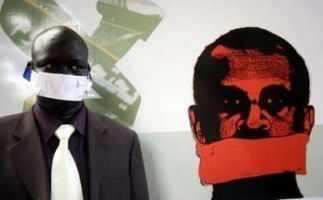Sudan charges journalists with defamation over rape case
March 19, 2011 (KHARTOUM) – Three Sudanese journalists have been charged with defamation by the local authorities for writing about the rape of a Sudanese female activist last month, in the latest assault against press freedom in the highly-censored country.

The demonstration, which failed to take on a mass appeal, was swiftly dispersed by Sudanese anti-riot police supported by members of the National Intelligence and Security Services (NISS) who arrested dozens of activists, including journalists who were covering the event, prompting a condemnation from the global press watchdog Reporters Without Borders (RWB)
“We condemn the wish of the Khartoum government to censor news by intimidating journalists and dissuading them from covering protest movements,” RWB said in a release on 31 January.
Saffiya Ishaq, a female activist affiliated with the youth anti-government group Grifna, claimed she was beaten and gang-raped by three plain clothes security men nearly three weeks after she took part in the protests, igniting a wave of furious reactions and calls for an investigation.
Three prominent journalists, including the columnist of Al-Akhbar daily newspaper Faysal Muhammad Salih, Amal Habani of Al-Jareeda newspaper and Fayiz Al-Silaik of the SPLM-linked Ajrass Al-Hurriyah, said they were charged with defamation and publishing false information on the grounds of their calls for an investigation into Saffiya’s case.
“They want to scare people to terrorize the journalists so they don’t write about their abuses,” Amal Habbani told Reuters on Saturday, saying that her paper had sacked her fearing retribution from the security services.
Faysal Mohamed Salih told Reuters that the charges aim to scare journalists into silence, adding that the charges brought against him and his paper under the media law and the criminal code were punishable by a prison sentence and/or a hefty fine.
RWB issued a statement condemning the charges and accusing the judiciary of collusion with the security services.
“This is yet another example of a determination to gag the press and curb free expression,” RWB Secretary-General Jean-Francois Julliard said in a statement.
“Nothing should be allowed to prevent the media from covering human rights violations in Sudan, which continue to be extremely worrying,” he added.
Sudan, which is ranked as 172 out of 178 in RWB’s world press freedom index, has long used a wide array of methods to circumvent the rights of free expression guaranteed under its interim constitution of 2005.
The NISS, which guards against the publishing of sensitive topics, is granted wide powers under the security law act and its members enjoy immunity from prosecution.
Broadcast media in Sudan is tightly controlled by the state whereas print-media outlets are forced to practice self-censorship for fears of being denied government advertisements on which most newspapers rely to sustain themselves in the absence of high-circulation.
In a related development, Sudan last week issued police summons for a number of civil society activists who visited the house of Saffiy Ishaq’a family, including Mariam Al-Sadiq al-Mahdi of the National Umma Party. The activists were charged with “criminal complicity” and “inciting ethnic hatred.”
(ST)
